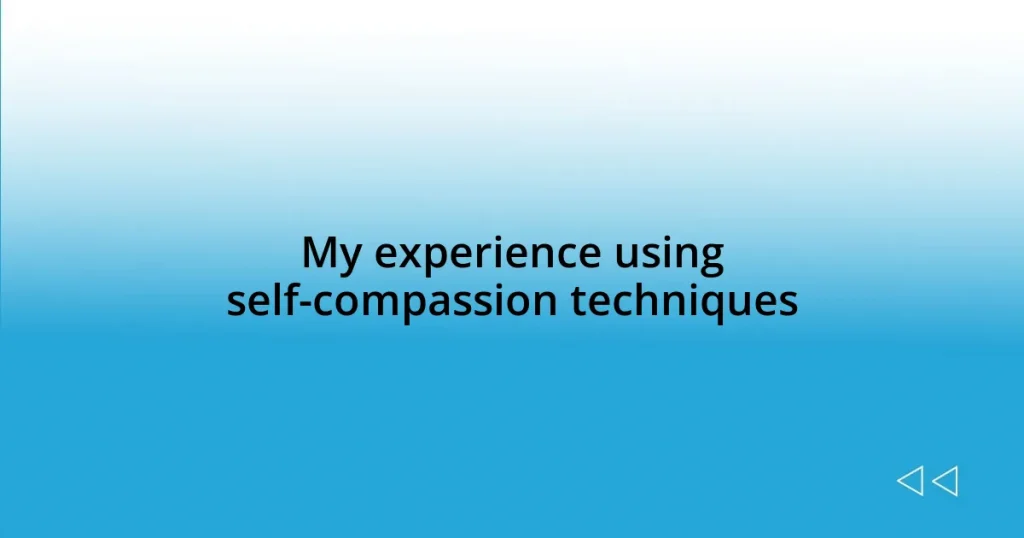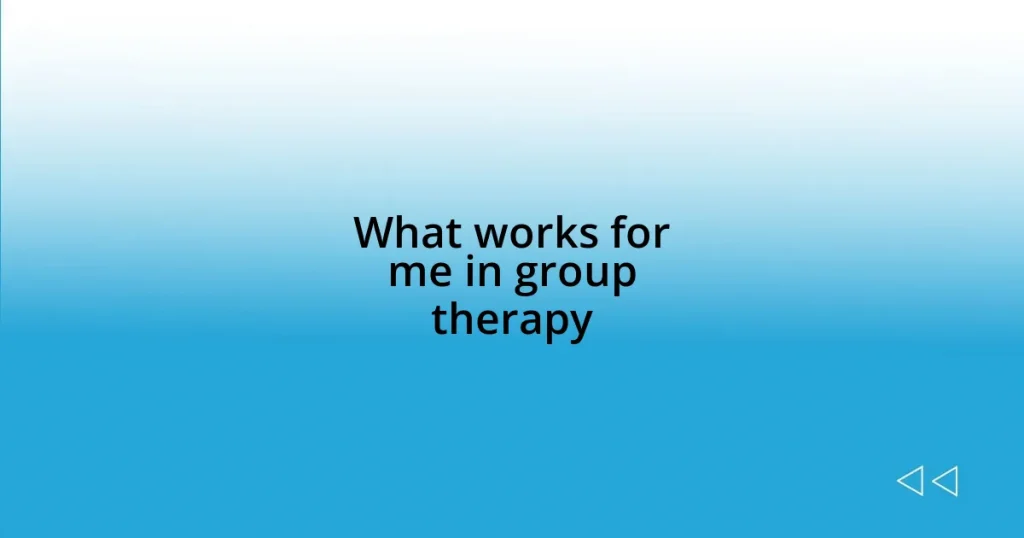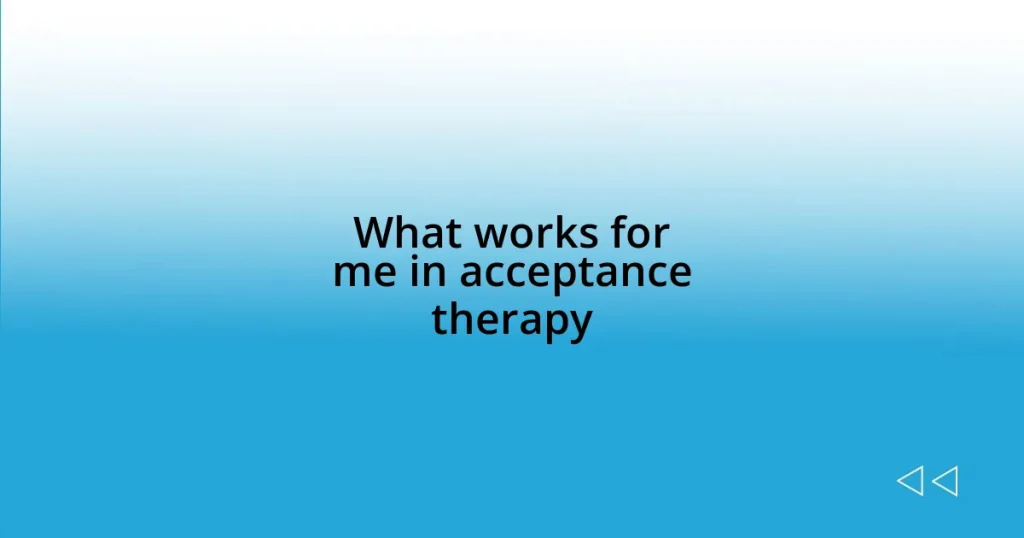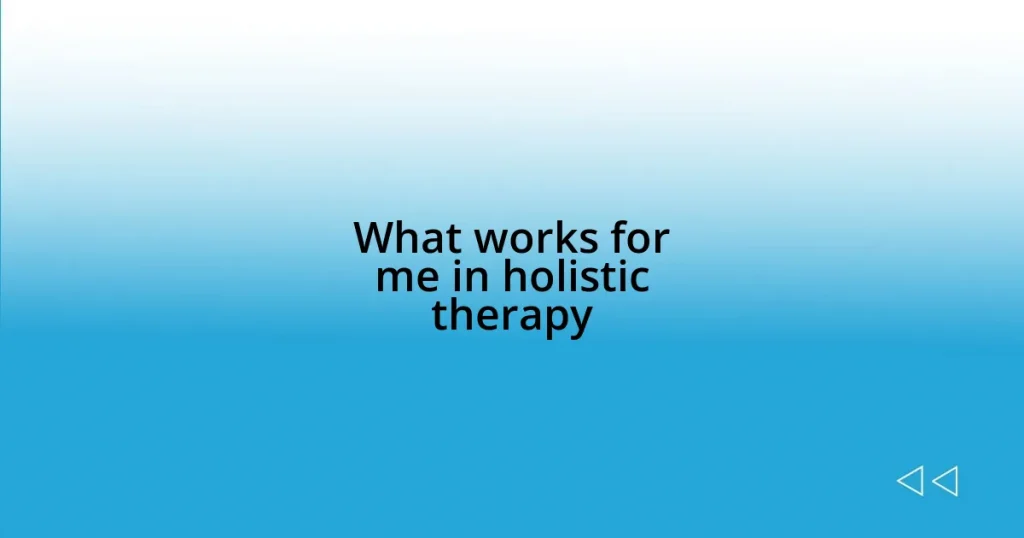Key takeaways:
- Self-compassion consists of self-kindness, common humanity, and mindfulness, which collectively help in recognizing and reframing self-criticism.
- Implementing self-kindness practices, such as positive self-talk and encouragement notes, significantly boosts morale and emotional resilience.
- Developing mindfulness through techniques like mindful breathing and observing emotions without judgment promotes self-acceptance and reduces self-criticism.
- Incorporating self-compassion rituals into daily life, like morning self-check-ins and affirmations, helps create a foundation of positivity and emotional clarity.
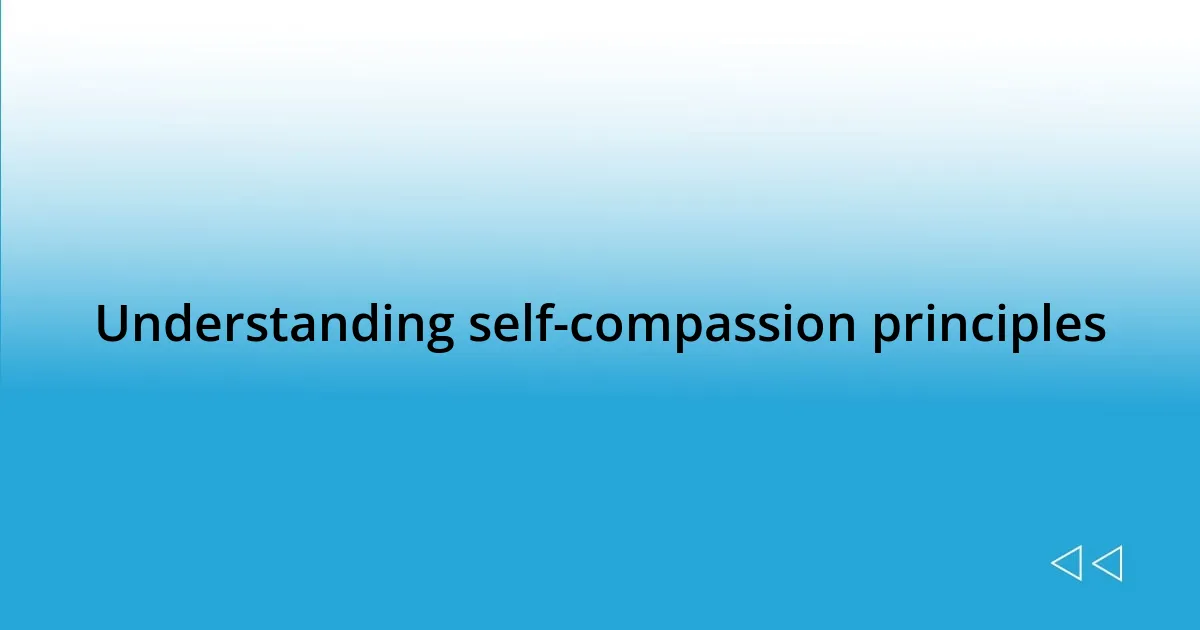
Understanding self-compassion principles
Self-compassion revolves around three core principles: self-kindness, common humanity, and mindfulness. When I first delved into these concepts, I realized how often I was my own harshest critic. Have you ever caught yourself thinking that you’re alone in your struggles? Embracing the idea of common humanity helped me recognize that everyone experiences pain and failure, which can shift our perspective from isolation to connection.
Self-kindness, for me, was a revelation. I vividly remember a tough week when I faced multiple setbacks at work. Instead of berating myself for not being perfect, I decided to treat myself as I would a dear friend. It was liberating to acknowledge my feelings of disappointment without judgment, allowing me to process my emotions in a healthier way.
Mindfulness played a crucial role in my journey toward self-compassion. I often found myself getting lost in negative self-talk, spiraling into anxiety. By practicing mindfulness, I became more aware of my thoughts and feelings without getting swept away by them. This awareness opened up space for self-compassion to take root, and I learned to pause and gently remind myself that it’s okay to be imperfect. How do you cultivate mindfulness in your life? It truly can change the way you see yourself.
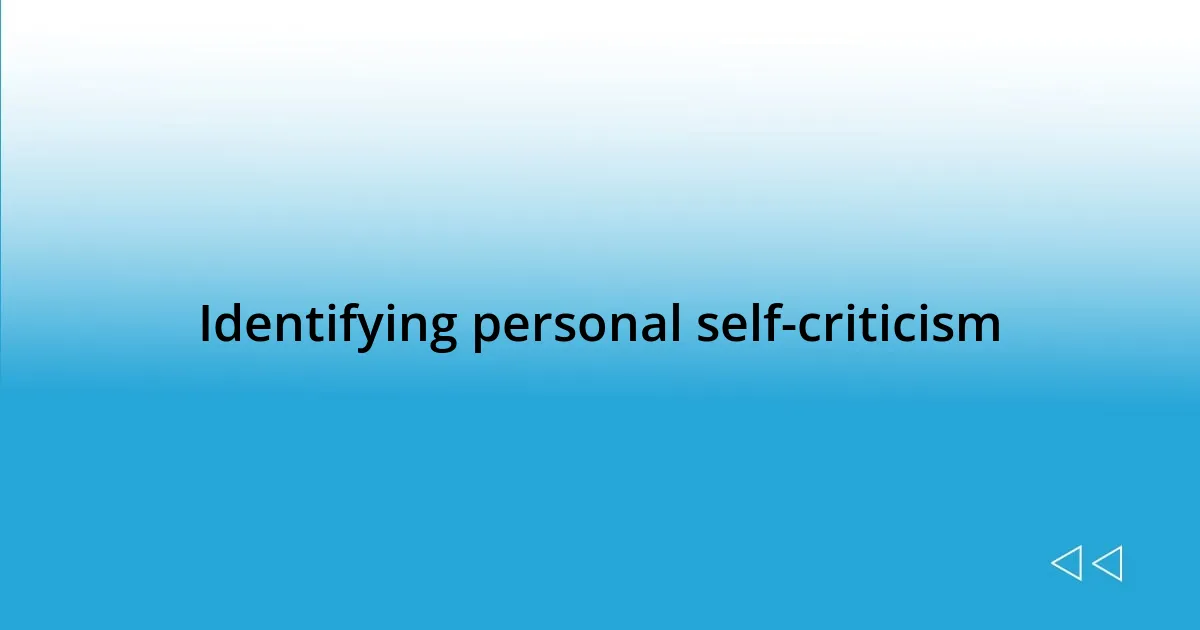
Identifying personal self-criticism
Identifying my personal self-criticism was a journey I underestimated. At first, I didn’t even recognize the voice that constantly echoed in my head, reminding me of every mistake I’d made. It often sounded like a friend who loved to offer unsolicited advice but never considered my feelings. A turning point for me was when I started paying attention to my internal dialogue. Here are some feelings and phrases that often surfaced:
- “You’re not good enough.”
- “Why can’t you do this right?”
- “Everyone else has it together, and you don’t.”
As I unearthed these harsh criticisms, I began to realize how detrimental they were to my well-being. Each time I caught myself in these critical thoughts, I took a step back and reflected on their origins. I remembered a long, nerve-wracking presentation I’d given; instead of celebrating my effort, I dwelled on the areas I had flubbed. This shifting of focus helped me understand that my self-criticism didn’t only stem from the present but was often colored by past experiences and fears, allowing room for deeper self-reflection.
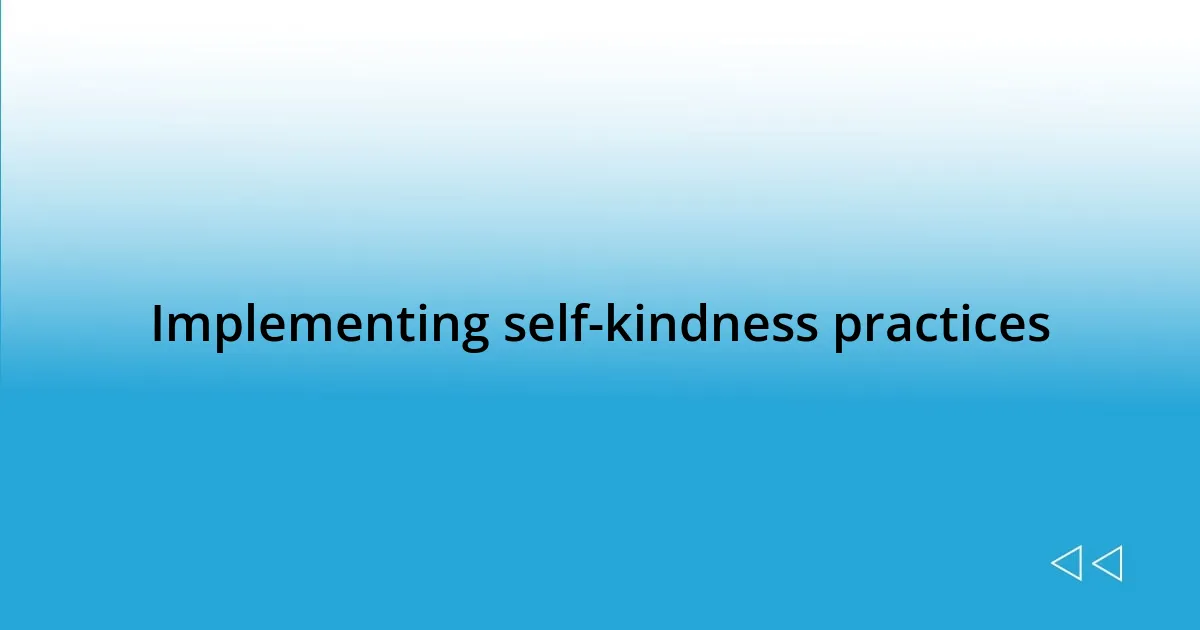
Implementing self-kindness practices
Implementing self-kindness practices has transformed the way I approach challenges and setbacks. Often, I find that simply acknowledging my struggles with a gentle voice can be incredibly powerful. For example, after a particularly challenging workout, instead of focusing on my perceived failures, I practiced self-kindness by reminding myself that it’s okay to have off days. This shift in language creates a sense of compassion rather than criticism that fuels my motivation rather than stifling it.
Another practice I’ve found valuable is writing myself notes of encouragement. I recall one time during a stressful project; I scribbled down phrases like “You are doing your best” and “Mistakes are part of the journey” and left them on my desk. Every time I felt overwhelmed, those notes acted as gentle reminders to treat myself as I would treat a friend in distress. I learned that these small acts of self-kindness could significantly boost my morale and enable me to face difficulties with a more supportive mindset.
Finally, creating a self-kindness ritual has been a game-changer. On days that feel especially intense, I allocate a few minutes to engage in deep breathing and visualize embracing my inner child. It’s a comforting exercise where I imagine wrapping myself in a warm blanket of love and understanding. This practice not only grounds me but also fosters a nurturing internal dialogue that helps me navigate life’s hurdles with grace. How have you practiced self-kindness in challenging moments?
| Self-Kindness Practices | Impact on Well-being |
|---|---|
| Positive Self-Talk | Encourages resilience and boosts self-esteem |
| Encouragement Notes | Serves as reminders of self-worth during tough times |
| Visualization Techniques | Creates a nurturing inner dialogue that promotes calmness |
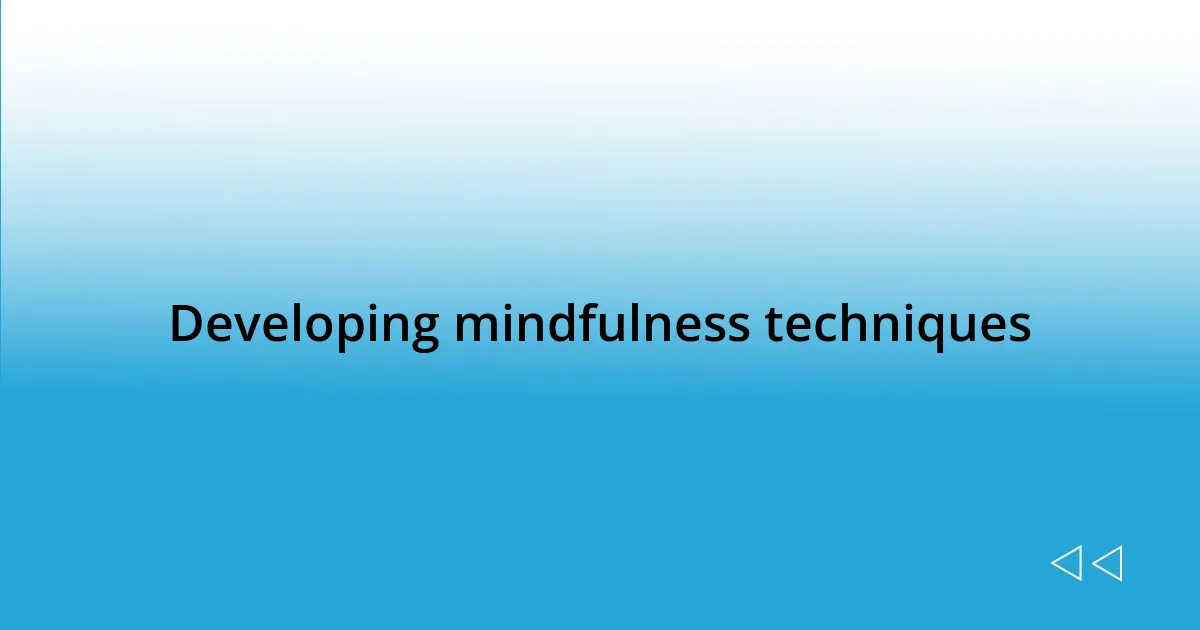
Developing mindfulness techniques
In my journey toward developing mindfulness techniques, I discovered that establishing a regular practice can make a significant difference in staying present. One method I embraced was mindful breathing. Each morning, I began setting aside a few minutes to simply focus on my breath, observing the rise and fall of my chest. It may sound simple, but this practice awakened a sense of calm that I often carried with me throughout the day. Have you ever noticed how just a few deep breaths can shift your mood entirely?
I also found that incorporating mindfulness into everyday activities made a world of difference. For instance, during my daily walks, I consciously tuned in to my surroundings—the rustling leaves, the warmth of the sun, and even the rhythm of my feet against the ground. This immersion in my environment helped me develop an appreciation for simple moments, creating a space where self-criticism began to fade. How often do we forget to truly engage with the world around us?
Finally, I’ve realized the importance of cultivating a non-judgmental attitude towards my thoughts and feelings. One challenging day, after an uncomfortable setback at work, I practiced observing my emotions without labeling them as good or bad. Instead of pushing away frustration, I sat with it, acknowledging that it was a valid response. This practice taught me that accepting my feelings is a crucial step toward understanding myself better. Wouldn’t it be freeing if we could all accept our emotions without judgment and just allow them to be?
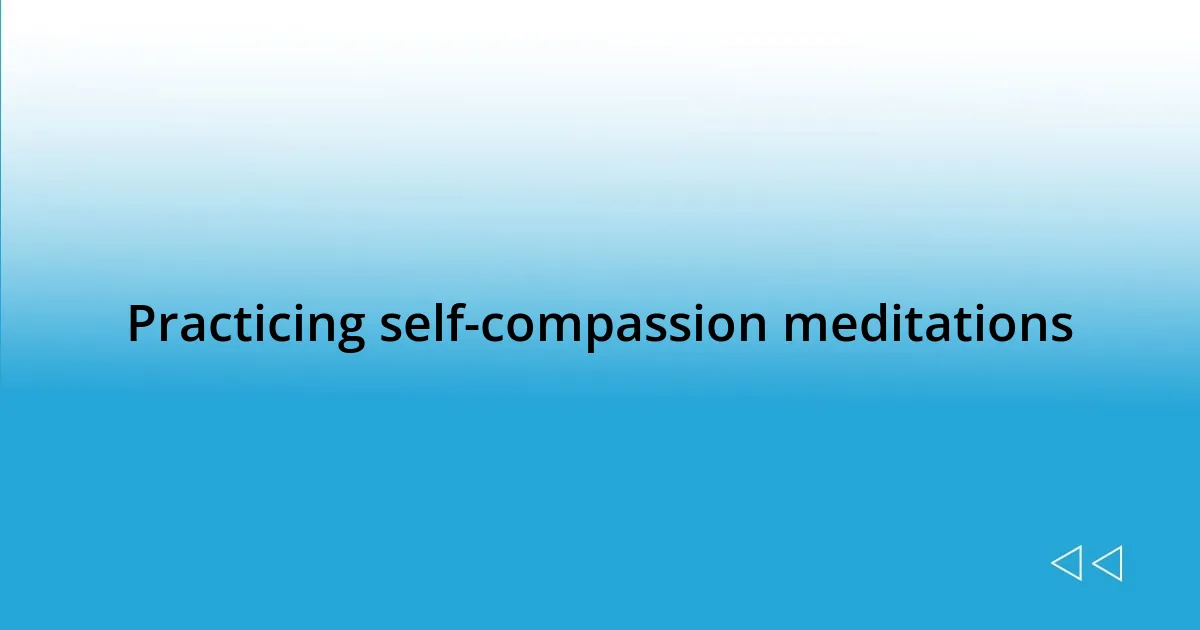
Practicing self-compassion meditations
Practicing self-compassion meditations has opened new doors for me in terms of self-acceptance. I remember one particular session where I visualized a soft light surrounding me, symbolizing warmth and unconditional love. It felt soothing as I repeated phrases like “I am enough” and “It’s okay to struggle.” This practice helped me embrace my vulnerabilities, transforming them into strengths rather than weaknesses.
During another meditation, I focused on the concept of common humanity. I pictured people around the world facing their own challenges, realizing that I’m not alone in my difficulties. This collective experience of struggle made my own feelings of inadequacy feel lighter. Have you ever considered how sharing our struggles connects us all? It’s a powerful reminder that imperfections are part of the human experience.
I’ve also explored loving-kindness meditation, which has left a profound impact on my relationships. I recall sending positive affirmations to myself, then extending that kindness to loved ones, and ultimately to anyone I had conflicts with. The shift was remarkable; as I cultivated compassion within, I noticed my reactions to others became more empathetic. I wonder how much our worlds would change if we adopted this habit regularly?
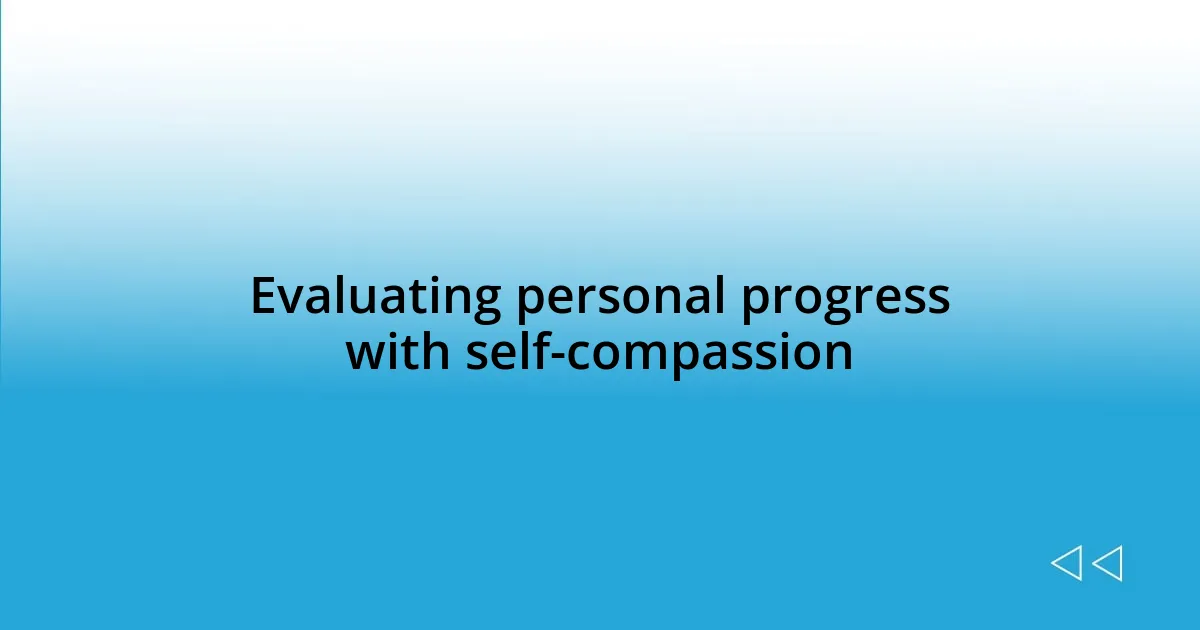
Evaluating personal progress with self-compassion
Evaluating personal progress with self-compassion is a journey that often reveals subtle shifts in how we view ourselves. I recall a moment when I felt disappointed about a small setback, which would have spiraled into relentless self-criticism in the past. Instead, I took a step back and acknowledged that everyone faces challenges. It was a revelation—realizing that, through self-compassion, I could view myself as a friend instead of a foe. Have you ever noticed how changing your internal dialogue can redefine your experiences?
As I continued to engage with self-compassion techniques, I started tracking my emotional responses more consciously. One evening, after struggling with an overwhelming sense of self-doubt, I sat down to journal my thoughts. I compared my reflections with those from a few months earlier and was astounded by the growth in my ability to validate my feelings without judgment. This process highlighted how my progress wasn’t about perfection but rather learning to embrace imperfection with kindness. Isn’t it amazing how self-acceptance can turn into a platform for growth?
Moreover, I began celebrating small victories as part of my self-compassion practice. Each time I noticed a moment of self-kindness, like choosing self-care over obligations, I would make a note of it. This exploration taught me that progress isn’t always loud and flashy; sometimes, it’s in the quiet moments of clarity when I choose compassion over criticism. How often do we overlook these small but significant milestones on our journey to self-acceptance?
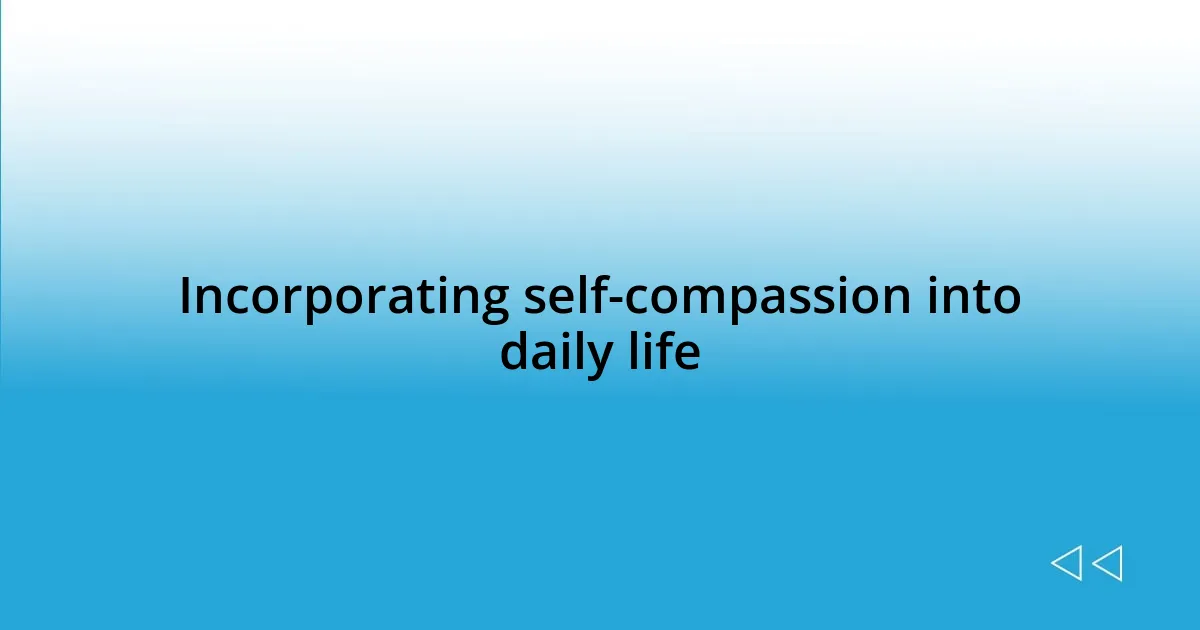
Incorporating self-compassion into daily life
Incorporating self-compassion into daily life has been a profound shift for me, especially when I started to integrate simple rituals. I remember setting aside a few minutes each morning to practice self-check-ins. Instead of jumping straight into my to-do list, I would take a deep breath, acknowledge how I felt, and remind myself that it’s okay to face challenges. This small yet impactful change transformed my day—starting with self-kindness laid a foundation of positivity.
I also found that using affirmations throughout the day made a significant difference. For instance, during stressful moments, I would pause and repeat phrases like “I’m doing my best” or “It’s okay to ask for help.” One afternoon, while grappling with a tough decision, I caught myself being overly critical. Instead of spiraling, I brought in self-compassion, which allowed me to approach my dilemma with more openness and clarity. Have you ever noticed how shifting your mindset in the moment can lighten emotional burdens?
Hosting self-compassionate conversations with friends has truly deepened my practice. I recall a coffee date where we shared our struggles and triumphs, focusing on empathy instead of judgment. It felt invigorating to hear others voice their fears and shortcomings, realizing we all carry similar weights. I wonder how many connections deepen when we share our vulnerabilities openly? In these moments, I discovered that practicing self-compassion in community can amplify its effects and create a supportive environment for growth.











